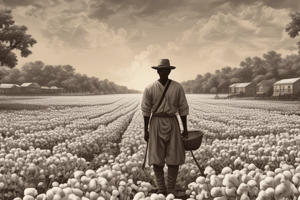Podcast
Questions and Answers
What was the primary reason for economic inequality in the South during the period of slavery?
What was the primary reason for economic inequality in the South during the period of slavery?
- The concentration of wealth among a small number of plantation owners (correct)
- The lack of upward social mobility for poor white farmers
- The unequal distribution of land among white households
- The absence of industrialization and economic diversification
Which of the following statements is true about the distribution of wealth in the South before the Civil War?
Which of the following statements is true about the distribution of wealth in the South before the Civil War?
- Wealth was evenly distributed among all white households
- Fewer white households owned enslaved people in 1860 than in 1840 (correct)
- Most white households owned at least a few enslaved people
- The majority of white households were wealthy plantation owners
What factor helped to defuse class tensions among white people in the South during the period of slavery?
What factor helped to defuse class tensions among white people in the South during the period of slavery?
- The equal distribution of wealth among all white households
- The promise of upward social mobility for poor white farmers
- The absence of racism and racial discrimination in the South
- The belief in white supremacy shared by both poor and wealthy whites (correct)
According to the passage, what was a common fear shared by all white southerners, regardless of their economic status?
According to the passage, what was a common fear shared by all white southerners, regardless of their economic status?
Which of the following statements is NOT supported by the information in the passage?
Which of the following statements is NOT supported by the information in the passage?
What was the primary reason for the domestic slave trade in the United States?
What was the primary reason for the domestic slave trade in the United States?
How did slaveholders in the Upper South use the phrase 'to be sold down the river' as a threat?
How did slaveholders in the Upper South use the phrase 'to be sold down the river' as a threat?
What was the economic impact of the domestic slave trade on white men?
What was the economic impact of the domestic slave trade on white men?
What was the impact of the domestic slave trade on the enslaved population in the United States?
What was the impact of the domestic slave trade on the enslaved population in the United States?
What was the impact of the abolition of the foreign slave trade in 1808?
What was the impact of the abolition of the foreign slave trade in 1808?
Flashcards are hidden until you start studying
Study Notes
Economic Inequality in the South
- The South prospered due to enslaved people producing a substantial portion of the nation's wealth, but wealth was very unequally distributed.
- Upward social mobility did not exist for the millions of enslaved people.
- Poor southern whites envisioned owning enslaved laborers of their own, but only three percent of white people owned more than 50 enslaved people by 1860.
Distribution of Wealth
- By 1860, there were more millionaires per capita in the Mississippi River Valley than anywhere else in the United States.
- However, two-thirds of white households in the South did not own any slaves at all.
- Distribution of wealth became more and more concentrated at the top, with fewer white people owning enslaved laborers in 1860 than in 1840.
Racism and Social Bonds
- Non-slaveholding white people, including yeoman farmers, shared a common set of values with white planters, notably a belief in white supremacy.
- Whites, whether rich or poor, were bound together by racism, defusing class tensions among whites.
- The institution of race-based slavery created a sense of unity among whites, regardless of their economic status.
Domestic Slave Trade
- The domestic slave trade supplied the necessary labor force for the cotton boom in the Deep South.
- Although Congress abolished the foreign slave trade in 1808, Americans continued to smuggle Africans across the Atlantic Ocean.
- The domestic slave trade offered many economic opportunities for white men, with over half a million enslaved laborers sold from Virginia between 1790 and 1859.
Forced Migration
- The phrase "to be sold down the river" refers to the forced migration of enslaved laborers from the upper southern states to the Deep South, where conditions were harsher and chances of escape were lower.
- This forced migration made up one of the largest forced internal migrations in the United States.
- Slaveholders in the Upper South wielded the notion of being "sold down the river" as a threat to keep their slaves in line.
Studying That Suits You
Use AI to generate personalized quizzes and flashcards to suit your learning preferences.




